Sliding doors - everything you need to know before you buy
Have you always wanted uninterrupted garden views and easy access to the outdoors? Find out if installing sliding doors could be the answer
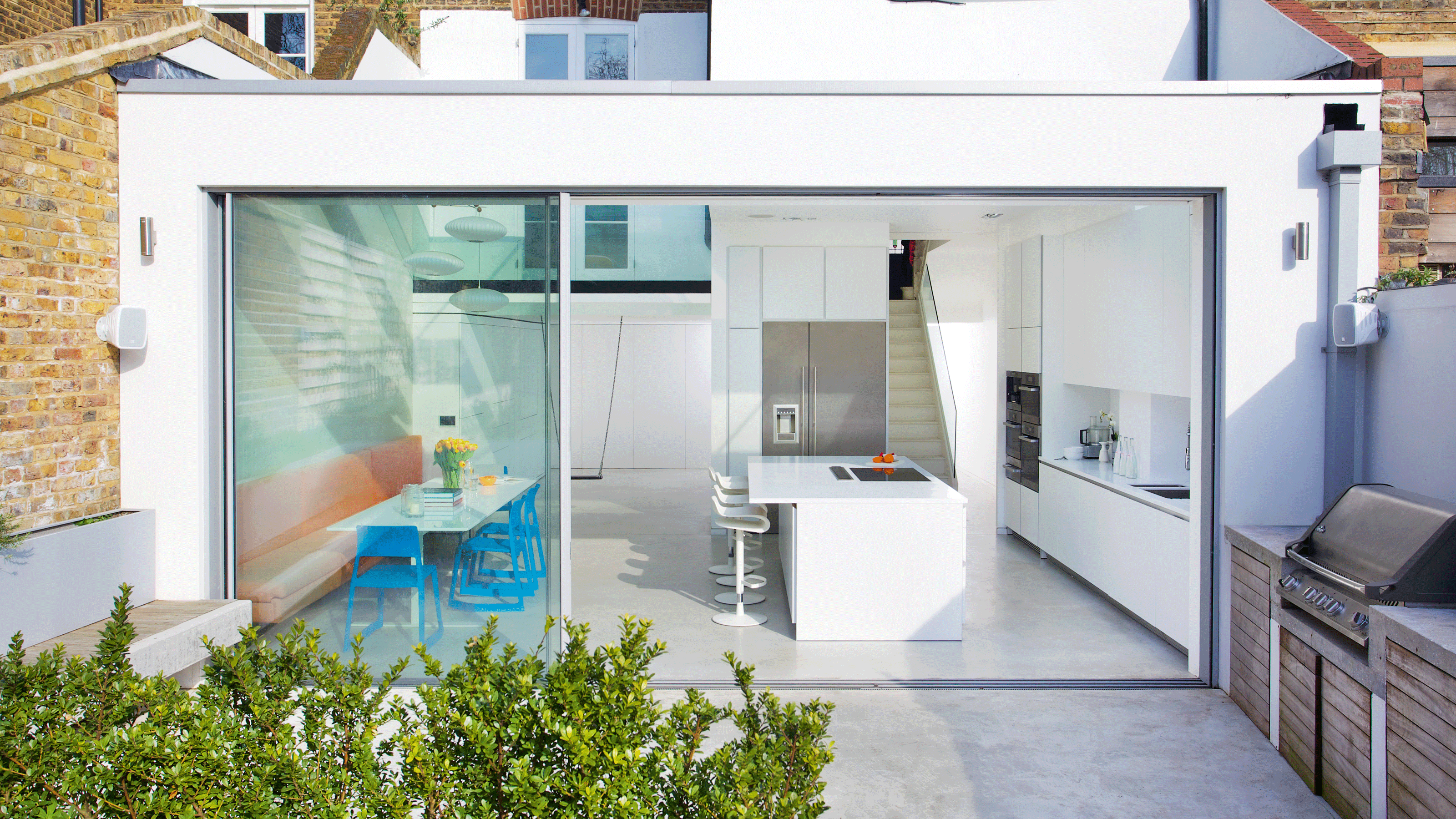

With frame profiles getting thinner and advanced runners offering smoother openings, modern sliding doors are fast becoming the top choice to enable a closer connection with your garden or patio.
Whether you're playing around with kitchen extension ideas or just want to upgrade your existing patio doors, you might be wondering whether sliding doors are worth the hype - and the investment. Or if it's easier to just stick to traditional doors that swing forwards and backwards. Plus, there's quite a lot to get your head round when it comes to sliding doors, from the type, to the space required, to the cost involved.
'There has been a noted increase in the popularity of sliding doors in recent years, which has seen a resurgence in the use of aluminium profiles,' says Ryan Schofield, Managing Director, Thames Valley Window Company. 'Sliding doors have evolved a lot over the decades, in terms of both their visual appeal and the technology and engineering behind their manufacture.'
So you can get clued up before you buy a new set of sliding doors, we've asked the experts to tell us anything and everything about them.
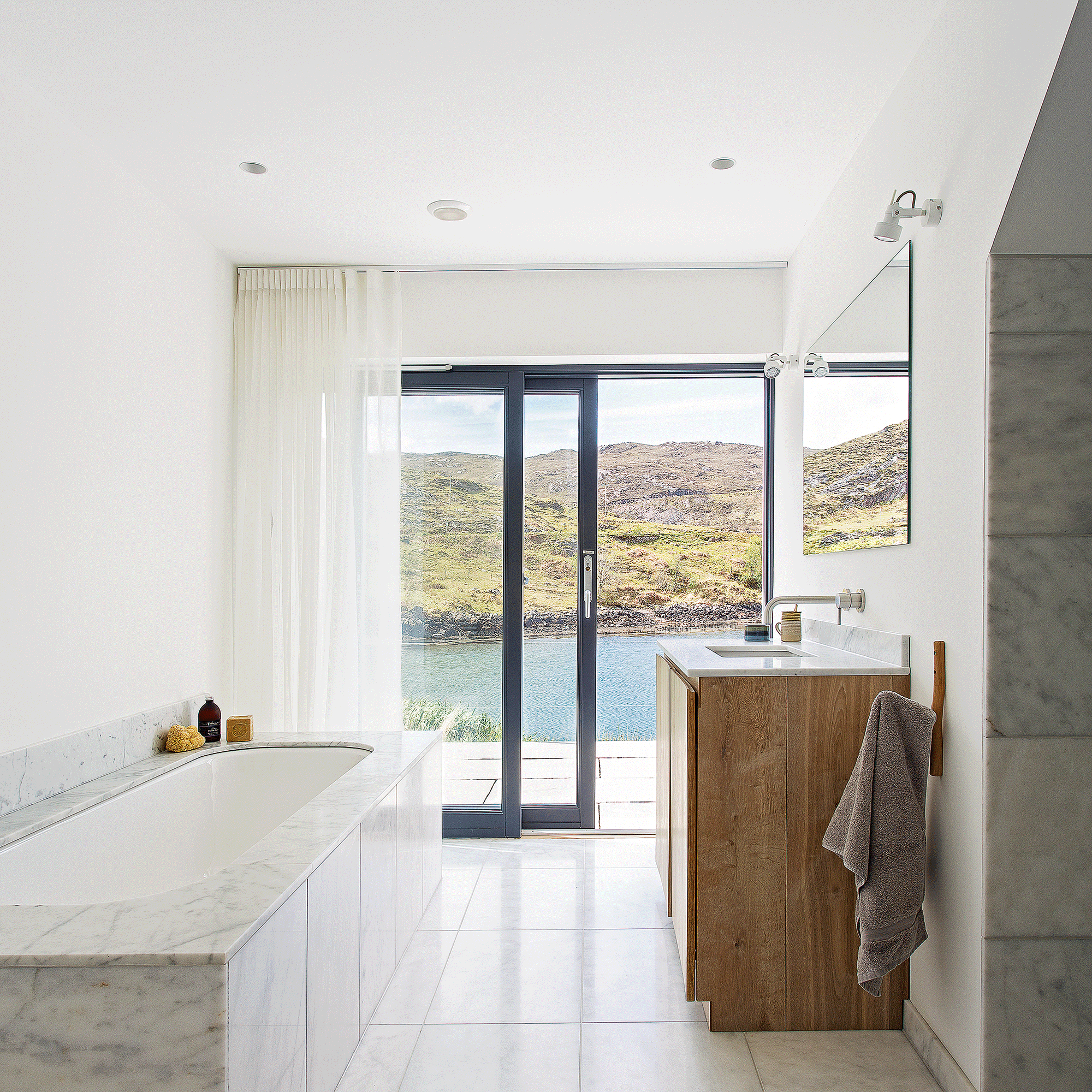
Sliding doors - everything you need to know
Sliding doors vs bi-fold doors
'Sliding doors tend to be made up of two to six panels of glass, which slide sideways, along a track (as opposed to bi-fold doors which fold in a concertina-style manner)', says Ryan. 'They can be designed in a choice of configurations and sliding combinations, or even lift and slide variations for ease of operation with heavier panels.'
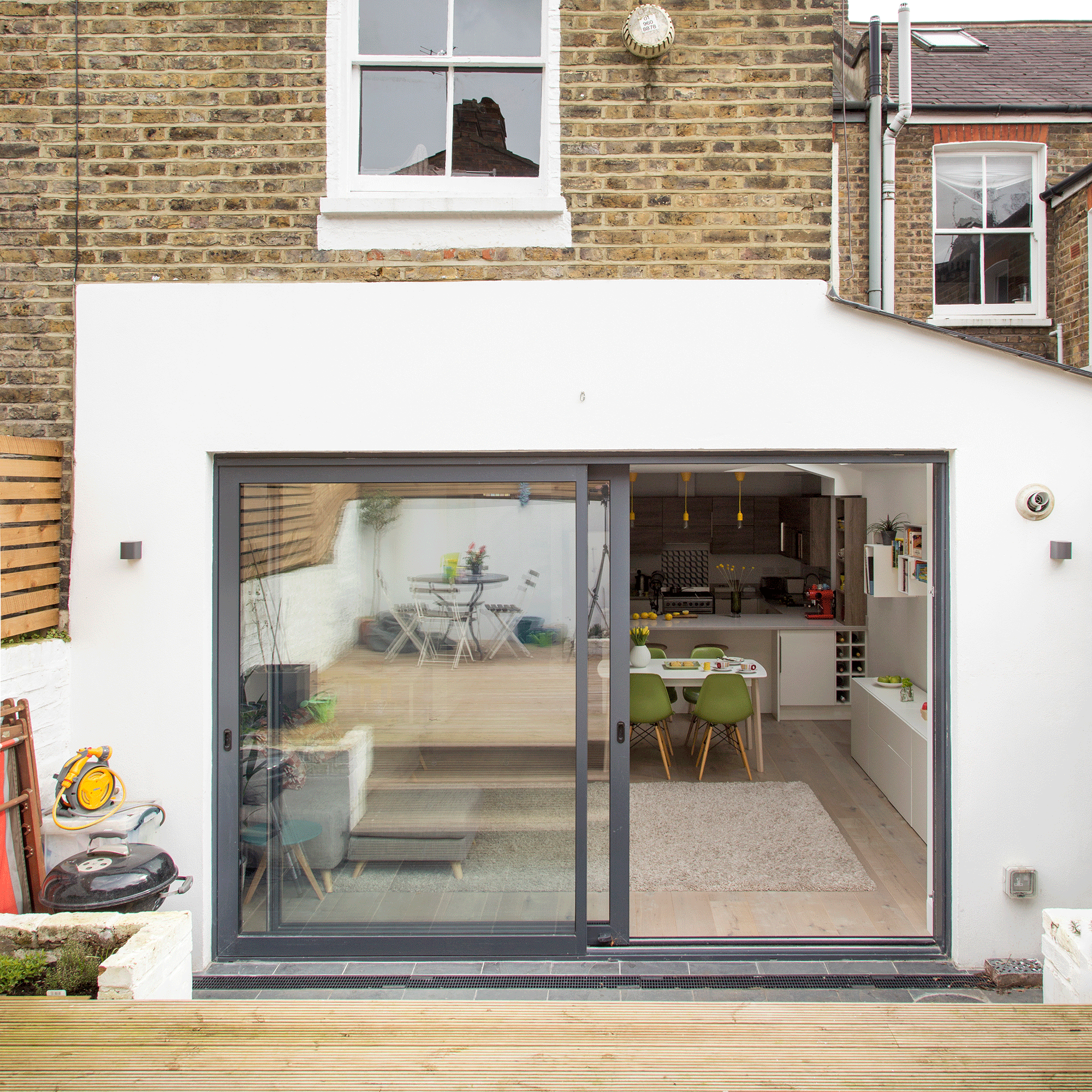
Sliding doors naturally require less space than traditional doors, which swing forwards when they open. They are usually found at the back of the house because they give an open view of the garden from the kitchen.
Aside from regular sliding doors which slide back and forth along a track, the other popular choice is bi-fold doors, which subdivide the glass multiple times and need stacking space when opening. Regular sliding doors are generally neater and require less space. 'Sliding doors offer greater control than bi-fold doors as they can be opened to add just an inch of fresh air if desired, or a couple of feet to pop outside', explains Ryan.
However, it’s worth noting that sliding doors won’t open up quite as much as bi-fold doors, as the sliding panel sits behind another so they don’t give you the same scale of opening.
'We think bi-fold doors are overall a more versatile option as they can be configured with any number of panels and can be installed into bays or corners', says Victoria Brocklesby, COO, Origin. 'They can also be designed to open in one direction, in the middle, or in various arrangements depending on the homeowner and their needs.'
As bi-fold doors can be folded back completely, they may be the better option if your main concern is to have plenty of space for people to flow from the kitchen to the garden. If you're more interested in garden views and are happy with a door that simply slides from side to side, sliding doors are a safe option.
How much will sliding doors cost?
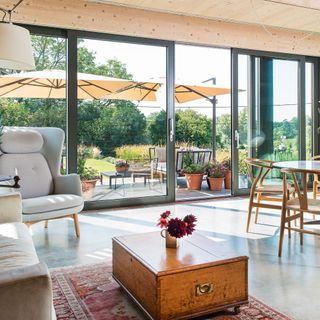
'The cost of sliding and bi-fold doors are comparable but vary significantly depending on the exact specifications,' Victoria says. 'Size is the biggest factor that impacts cost. If you require a bigger door, it will cost more to manufacture, install, and deliver. Similarly, non-popular colours and specialised glazing will also add to the bill.'
Your installer will be able to recommend the best value option for your build, depending on the location of the doors and your property’s requirements.
What are the size options?
The width of a sliding door ranges from 0.8m to 3m. Height also has an impact - if the glass is very tall, it can't be as wide. You also need to consider weight. An automated opening system is recommended for doors over 600kg.
'If you have more than four metres in width, we'd recommend sliding doors,' says Steve Bromberg, General Manager, Express Bi-folding Doors.
Which material is best?
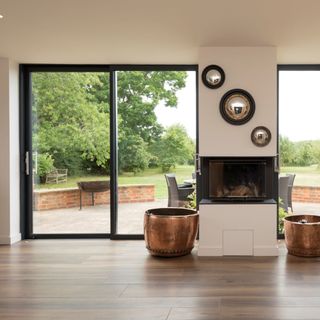
'Sliding doors are most popular in aluminium but are also available in UPVC and timber, as well as a combination of timber and aluminium,' explains Ryan.
UPVC is the most affordable option, but it's not terribly strong, so the frames will be fairly thick. Timber is a classic choice. Go for hardwood or engineered timber if your budget allows. If you choose softwood, make sure there's a decent guarantee, as these can be a little more flimsy.
Aluminium offers the slimmest profile, which equals virtually uninterrupted views. They're a little more costly but could be worth the extra pennies if you want sliding doors that blend seamlessly into your kitchen. At the top end, you can buy frameless structural sliding glass, but you'll need very deep pockets!
Is there a choice of colour?
Aluminium is powder-coated, which is very low maintenance and, again, the colour options are vast. Black and dark grey, which leads to a 'Crittall' steel look, are currently in vogue and work well with modern kitchen ideas.
If you opt for sliding doors in wood, the frame can be stained or painted - usually in any RAL colour.
What about the fit?
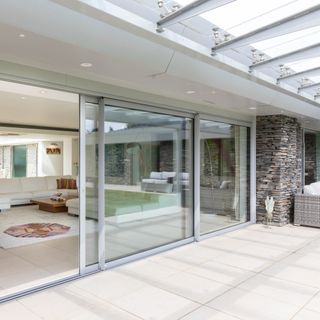
To keep the doors sliding smoothly, it's important that the walls above don't transfer any weight onto the door frame - a steel support beam may be required in wide openings. The floor also needs to be solid, to keep the tracks straight and level. Lift and slide runners, with heavy-duty bearings, are preferable.
The fitting process is critical; if the sliding doors aren't installed correctly, you'll know about it at some point down the line, even if they seem to work fine at first.
Caring for your sliding doors
The track and mechanisms of sliding doors need to be kept clean of dirt and debris, otherwise, they’ll stick or derail,' says Ryan McDonough, Interior Design Expert, MyJobQuote. 'If there is a problem with the mechanism, it can be awkward to fix, especially if the doors are heavy.'
It's worth vacuuming the track and wiping round the roller mechanism every couple of weeks or so to make sure there are no obstructions. If you are having problems, you can usually learn how to fix glass sliding doors yourself.
Sliding doors we love
1. Good wood
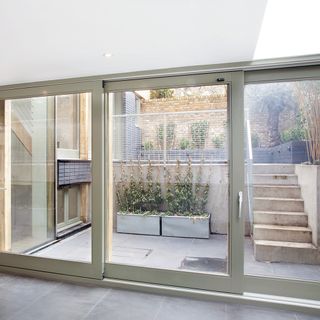
Grandis Hardwood sliding doors in Moss Grey, from £2,500, George Barnsdale
2. Triple glazing
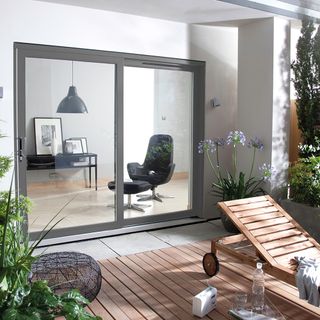
Fenton softwood sliding door set in Dusky Grey, from £1,677, Jeld-Wen
3. Heavy-duty design
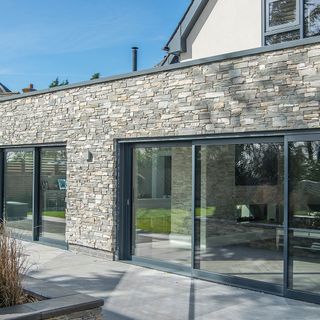
XP Glide S aluminium sliding doors, from £1,650 per m, Express Bi-folding Doors
4. Slender frames
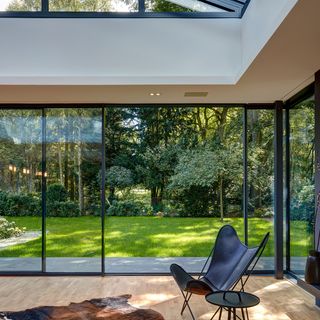
Cero sliding glass doors, from £15,000, The Caulfield Company
The best sliding door companies for...
EASY CARE
The Alternative Window Company's eco-friendly sliding doors are made from self-cleaning glass with a composite frame that requires zero maintenance.
GRAND DESIGNS
IQ Glass supplies architectural glass systems - its installation and design team come highly rated.
SECURITY
Sunflex UK's sliding doors feature five-point locks, anti-lift blocks and the latest laminate security glass.
What are the disadvantages of sliding doors?
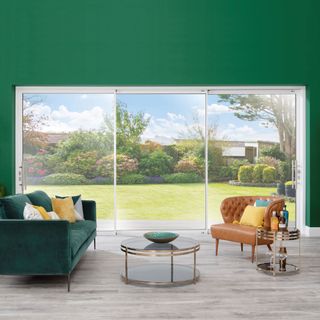
If you know you want a transparent view of the garden and a door that saves on space, a sliding patio door could be for you. Though remember that bi-fold doors are considered more versatile in terms of where they can be placed, and they fold back completely to offer more space for people to walk through.
'Bi-fold doors can also be installed with either a level or weathered threshold, whereas a sliding patio door cannot have a level threshold,' says Victoria, Origin. 'A level threshold removes trip hazards, creating a seamless transition which is a great option for people looking to make homes as accessible as possible.'
She adds, 'sliding patio doors are typically installed with either two, three, four, or six-door sets, but don’t have the same functionality to be used in bays or corners.'
Sliding and bi-fold doors are both generally more expensive than traditional doors, though if you keep on top of cleaning the track and roller mechanism, you shouldn't experience many issues with them.
Are sliding doors a good idea?
'Sliding doors, of any design, are an effective way to link the inside and out whilst only taking up minimal internal space,' says Victoria. 'They are a fantastic option for homeowners looking to create versatile and open spaces, perfect for entertaining or for accessibility needs.'
'Sliding doors are generally a good idea because they’re more compact than regular doors,' agrees interior design expert Ryan. 'This is because they don’t need space to swing open, which makes them useful for wide openings. They’re a good choice for creating flexible living spaces, allowing you to easily open out and close off a room or your garden.'
Sliding doors will make small kitchen ideas seem bigger, as they maximise light and help create the illusion of more space. They're worth considering if you're looking for a more budget-friendly alternative to a full-blown kitchen extension.
'Some experts have even suggested that adding sliding doors can add up to 5-10 percent to the value of a property, so they can make a great long-term investment too,' adds Victoria.
Have we convinced you to add sliding doors to your home?
Get the Ideal Home Newsletter
Sign up to our newsletter for style and decor inspiration, house makeovers, project advice and more.

Ginevra Benedetti has been the Deputy Editor of Ideal Home magazine since 2021. With a career in magazines spanning nearly twenty years, she has worked for the majority of the UK’s interiors magazines, both as staff and as a freelancer. She first joined the Ideal Home team in 2011, initially as the Deputy Decorating Editor and has never left! She currently oversees the publication of the brand’s magazine each month, from planning through to publication, editing, writing or commissioning the majority of the content.
- Katie SimsContributor
-
 Does salt kill weeds? Absolutely, but gardening experts urge you to take note of these key considerations first
Does salt kill weeds? Absolutely, but gardening experts urge you to take note of these key considerations firstThe most effective way to use it for maximum impact
By Jullia Joson
-
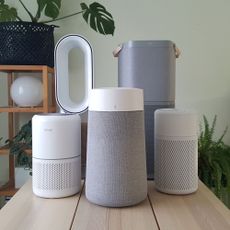 How we test air purifiers at Ideal Home
How we test air purifiers at Ideal HomeWe've put multiple air purifiers through Ideal Home's testing process to find the best-in-class. Here's how we do it.
By Amy Lockwood
-
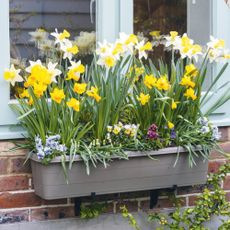 Planting ideas for window boxes – 10 ways to make the most of this tiny outdoor space
Planting ideas for window boxes – 10 ways to make the most of this tiny outdoor spaceFrom creating a herb garden to the best smelling blooms to plant, you'll be spoiled for choice
By Ellis Cochrane